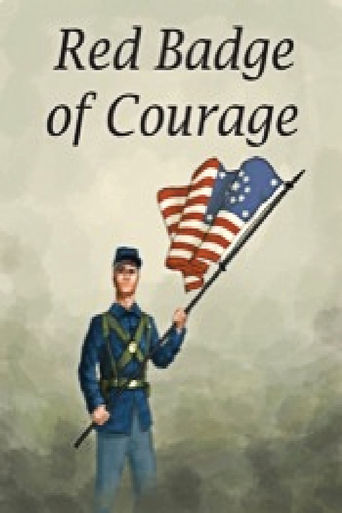Robert J. Maxwell
It's not a badly done telling of Stephen Crane's story of a young man being blooded in the Civil War. The performances are up to par. Richard Thomas by this time had outgrown his usual appearance of a recent graduate of Choate, yet still looks innocent enough to be the young soldier. The writer and director have added a few touches of their own to the tale. During the final charge into the Confederate lines, one soldier accidentally impales an oak tree and is stuck there for a moment.It's mainly when this version is compared to John Huston's 1951 version that the weaknesses are apparent, even though the budgets must have been similar. Huston had his improvised moments too -- a general riding from one regiment to the next, telling each to fight like hell and save him a plate of beans for when he joins them for supper that night. The same phony speech over and over, which the soldiers recognize and ridicule.But Huston's version is superior in many other ways. Here, the dying soldier tries to climb a tree before falling flat on the ground. In Huston's film, John Dierkes' death is horrifying rather than sad.There's something else too. In subtle ways, the direction by Huston is more effective than Lee Phillips' is here. Not that Phillips is inept but the way Huston manages the camera, the direction becomes part of the story. It's difficult to pin this down but, if you have a chance, watch the way Huston first introduces us to the young soldier, Audie Murphy, who gives the best performance of his career. As his buddy, Private Conklin, Bill Mauldin, a non-actor who was a famous cartoonist in World War II, is thoroughly believable, with his goofy face, whereas the same character here, Michael Brandon, looks and acts like a Hollywood actor. In Huston's film, the lieutenant in charge is of moderate height and slight build, with a scant but hopeful blond mustache. He's as young, vulnerable, and uncertain as his men. Here, it looks as if someone said, "Get me an infantry lieutenant from Central Casting."Well, it sounds as if I'm being harsh on this movie but obviously a good deal of effort and money were put into it and, as I say, the results aren't bad. It's rather that Huston did so much more.
moonspinner55
Stephen Crane's classic American novel concerning fictional Yankee private Henry Fleming of the 304th New York Regiment--who loses his courage to fight after seeing the random insanity of life and death on the battlefield--is not a natural for the screen. In 1951, writer-director John Huston had tried for a thorough adaptation of the story, but that theatrical feature left audiences unmoved and was drastically altered by its studio. This faithful television version has been smartly thought-out by writer John Gay and director Lee Philips and, despite some overwrought performances and distinct 1970s haircuts, contains many powerful sequences. Richard Thomas is perhaps a bit too old to be convincing as the teenage Henry (age 18 in the book), yet his character's confusion--and guilt over his cowardice--is overpowering and intensely felt. Injured by stampeding soldiers, Henry finds strength and personal redemption in being 'wounded', returning to his fellow recruits to carry the flag into battle. This psychological tale of wartime is demanding and dramatic, yet is laid-out for us cleanly, without any creeping pretensions. The locations are disappointing (most likely due to budget restraints), however the power of Crane's storytelling is palpably realized.
gia72
I have looked and searched, trying to find this movie, there has to be one out there some where, its on TV once and in great while..I would even settle for your own Home Made VHS of this movie. Why cant the release of this movie be retrieved? I once heard it was available as an import, but I still got no results. I remember watching this on cable TV, I think it was The Retro channel, any way, I HAD a copy of this movie on my Cable TV DVR, but my DVR broke and I had to get a new one, I wish I would have remembered to Record this movie, before I turned my DVR back to The Cable Co. Like other Reviewers I keep a watch out for this movie to be shown again. I think your best bet is: The Family Channel. please let me know if you find this movie in any form.
choctaweagle
When a movie is based on a novel, I judge the movie in its accuracy of portraying the intention of the novel's author. By far, this 1974 version was much closer to the events found in the text by Stephen Crane. The 1951 version changed the main focus -- the red badge -- into a yellow one. Also, the portrayal of events and the character depiction I feel were more in the tone that Stephen Crane intended in the 1974 (made for TV) version. I teach the novel on the high school level and have to make many more exceptions to the 1951 version than I do the 1974 version when I use the video versions.I must note that the leads in both versions (Murphy and Thomas) did excellent jobs in their portrayal of the main character Fleming. However, the other characters in the 1951 version did not come close to the ensemble group in the 1974 version. As a whole, the 1974 version did a better job in the creation of the mood and situation these men found themselves in the battlefields of the Civil War.


